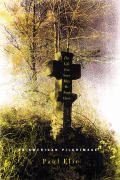
introducing readers to writers since 1995
April 09, 2005
Author2Author, Paul Elie & Pankaj Mishra, conclusion
by Ron HoganPaul Elie follows up on yesterday's reflections on the life and writing of Thomas Merton, returning to the contemporary spiritual/literary journeys he and Pankaj Mishra undertook in creating An End to Suffering and The Life You Save May Be Your Own:
 In a sense, I am writing against a common Catholic view of Merton as an adventurer in Buddhism, when what attracted him to the Buddhist monks he met was the fixity of their lives. But I am also writing toward some sort of insight about our lives--yours and mine--and our books. You sent me your last message from an Internet café in Katmandu: you have kept traveling, kept searching for new experiences and new points of reference. I am writing this message from an apartment in the East Village, in the hour before dinner and baths for my three young children: I am a husband, a father, and (though I cringe a little to say it) an office worker, and my search is conducted in the margins of an outwardly conventional middle-class life.
In a sense, I am writing against a common Catholic view of Merton as an adventurer in Buddhism, when what attracted him to the Buddhist monks he met was the fixity of their lives. But I am also writing toward some sort of insight about our lives--yours and mine--and our books. You sent me your last message from an Internet café in Katmandu: you have kept traveling, kept searching for new experiences and new points of reference. I am writing this message from an apartment in the East Village, in the hour before dinner and baths for my three young children: I am a husband, a father, and (though I cringe a little to say it) an office worker, and my search is conducted in the margins of an outwardly conventional middle-class life.
Yet my search and yours have something crucial in common. They are framed in terms of contrasts rather than absolutes, seen in terms of detachment rather than strict asceticism and renunciation, undertaken in travel and worldly experience rather than the restlessness of the soul (as Augustine had it) groping half-blindly back to a divine origin.
How different they are from Merton's search, or Gandhi's. What should we make of this fact? Have we adapted our different traditions to the circumstances of our place and time, or merely met our traditions halfway, rather than taking up their challenges wholeheartedly?
I wish I could answer my own question with confidence. The best I can do is this. Perhaps (since you and I are contemporaries) it suggests that we are creatures of our age, wary of the absolutes that seemed to drive people of the last century to fight wars of ideology--and that seem to be engendering new wars in this one. But perhaps (since after all we come from strikingly different cultures and backgrounds) it suggests that we are simply two writers of like temperament, inclined to subtlety, prone to see a question from two or more sides.
And maybe a kinship of temperament is enough, a rope bridge between the alienated. I learned in the writing of my book to be careful not to say what Thomas Merton would have thought about this or that. But it is worth pointing out that here we are, two writers, a Catholic and a Buddhist in our ways, in dialogue nearly four decades after his "Asian journey" of 1968--and with (as far as I can tell) relatively little to overcome in the way of differences or misperceptions. That we can do so is owing to his efforts--and to the efforts of the Buddhist searchers you describe in your book.
your PayPal donation
can contribute towards its ongoing publication.